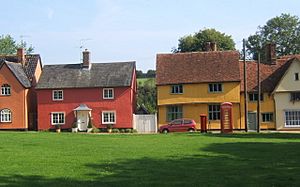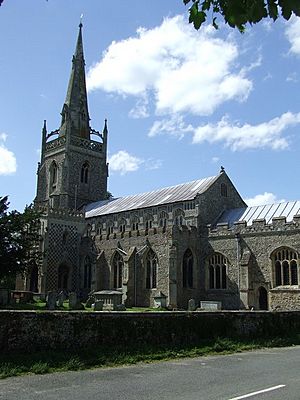Robert Gardiner (Chief Justice) facts for kids
Sir Robert Gardiner (born 1540, died 1620) was an important judge from England who worked in Ireland. He was the Lord Chief Justice of Ireland for 18 years. Besides being a judge, he was a trusted helper and adviser to two famous rulers: Elizabeth I and King James I. He also served as a member of the English House of Commons in a very short Parliament in 1614.
Contents
Becoming a Judge
Robert Gardiner was born in 1540. His father, William Gardiner, was a successful farmer in Suffolk, England. Even though Robert inherited enough land to live comfortably, he decided to become a lawyer.
He began studying law at Lincoln's Inn in 1562. This was a place where lawyers were trained. He became a lawyer in 1570. Some people thought he wasn't the busiest lawyer. However, a top judge named Chief Justice Wray still thought he was very smart and good at his job.
Working in Ireland
Queen Elizabeth I trusted Gardiner a lot, even though they sometimes disagreed. In 1586, she sent him to Ireland as the Lord Chief Justice of Ireland. He was given special powers to check how the courts were working. He was supposed to make the courts and government better, but it seems he didn't have much success.
Another important judge, Sir Christopher Wray, said Gardiner was "learned, wise, of good discretion and courage." This meant he was smart, sensible, and brave.
Irish Politics and Challenges
At that time, politics in Ireland was difficult. There was a big disagreement between the Lord Deputy of Ireland, Sir John Perrot, and his opponents. Gardiner sided with the opponents and helped get Perrot removed from his job.
Gardiner also helped deal with problems after the Desmond Rebellion in 1588. People criticized his decisions because almost all claims were decided in favor of the Queen.
During the Nine Years War, Gardiner tried to make peace with the rebel leader, Hugh O'Neill. This happened in 1594 and 1596. These peace talks made Queen Elizabeth very angry, and Gardiner was in trouble for a short time.
He even served as Lord Justice of Ireland in 1597, which meant he was in charge of the country for a while. He also fought in battles, including against Hugh O'Neill in 1598 and against the Spanish Army at Kinsale in 1601-1602.
Wanting to Retire
Gardiner and the Queen had a big argument in 1596 or 1597. This was because he agreed to peace terms with Hugh O'Neill that the Queen thought were too easy on the rebels. She felt it was like giving up English rule in Ireland.
Because of this, Gardiner was temporarily out of favor. He often asked to retire because of his health, but the Queen and other leaders always refused. They thought he was too important. They said they found "such sincerity, constancy and sincerity in him."
Gardiner, like many English people in Ireland, didn't like the damp Irish weather. He believed it was bad for his health. His job was also very demanding. For a time, he was in charge of three of the four main courts in Ireland. In 1592, the Lord Deputy, Sir William FitzWilliam, said Gardiner was too "wise, prudent and useful" to lose. Finally, in 1603, he was allowed to retire.
Later Life
After retiring, Gardiner wanted a quiet life. However, the new King, James I, found him just as reliable as Queen Elizabeth had.
Gardiner was asked to help improve the governments of Jersey and Guernsey in 1604-1605. He also advised the King on Irish matters in 1607 and again in 1613-1614. He was still active in local government as late as 1609.
Member of Parliament
In 1614, even though he was quite old, he became a member of the English House of Commons for Suffolk. He attended meetings regularly and spoke several times. However, this Parliament, known as the "Addled Parliament," was very ineffective. It was closed down after only two months.
Helping Others
In his final years, Gardiner founded special homes called almshouses in Elmswell. He owned the land there. These homes were for six poor women, three from Elmswell and three from nearby Woolpit, where he also owned land. This charity still exists today.
He died in 1620 and was buried in Elmswell. A memorial was put up for him in the local church.
Family Life
Sir Robert Gardiner was married three times. His first wife was Anne Cordell. His second wife was Thomasine Barker. His third wife was Mary (or Anne) Trelawney.
His three children with Anne all died when they were young. Most of his property went to his grand-nephew, Gardiner Webb. He also left some to his sister, Mary Snow.
Through his third marriage, he became the stepfather of Sir William Spring. Robert treated William like his own son. He raised William with his own strong Puritan beliefs.
His Character
Many people thought highly of Sir Robert Gardiner. Francis Bacon, a famous philosopher, said Gardiner was a good example of "constancy and integrity." This means he was steady and honest.
Other important people agreed. English Chief Justice Wray called him "wise, learned, discreet and courageous." Sir Henry Wallop said he was the most steady person sent from England to govern Ireland. Lord Deputy FitzWilliam said he was so "wise, temperate and useful" that the King could not easily do without him. After he died, someone wrote that he was "the favourite of his family, the glory of his friends."
Even though many officials at the time were sometimes dishonest, Gardiner was known for being honest. He said he didn't care about getting rich because he was happy with what his father left him. However, he probably did make some money from his job, as he was able to buy land in Elmswell, Woolpit, and Norfolk.
| Legal offices
|
||
|---|---|---|
| Preceded by James Dowdall |
Lord Chief Justice of Ireland 1586–1603 |
Succeeded by James Ley |
 | Aurelia Browder |
 | Nannie Helen Burroughs |
 | Michelle Alexander |



